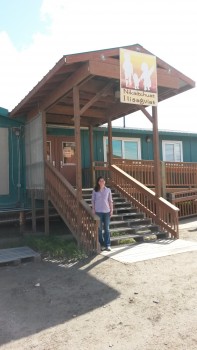Summer in the Arctic Circle

Katie Rowlett '14 in Alaska.
Details
Katie Rowlett '16 and Idun Klakegg '15 spent the summer in Kotzebue, Alaska, assisting Haverford anthropologist Joshua Moses on a community building project.
This summer, Katie Rowlett '16 and Idun Klakegg '15 dodged the July heat by heading north.
With the support of the Center for Peace and Global Citizenship, Klakegg and Rowlett spent the summer in the rural Alaskan town of Kotzebue, serving as research assistants on a project spearheaded in part by Haverford Anthropology professor Joshua Moses. The project, called Intergenerational Dialogue, Exchange, and Action (IDEA), is designed to boost community understanding and wellness.
Kotzebue, whose population is 85% Native Alaskan, is located 30 miles north of the Arctic Circle. Klakegg and Rowlett spent much of their time working in tandem with three other undergraduate co-researchers, and a group of 10 local high school and college students, to facilitate dialogues and media projects with intergenerational groups in the community. The discussion topics ranged from leadership, to local politics, to cultural heritage issues, and focused primarily on the needs of the people of Kotzebue.
The two Haverford students also worked together to create a survey for the local Inupiaq language immersion school, to assess how best the school can meet the needs of the community. Inupiaq, the heritage language of the people of Kotzebue, is currently endangered, and the town developed the school to fight language and cultural decay in its youth. By writing and conducting the survey, which involved extensive interviews with local residents, Rowlett, a chemistry major, and Klakegg, a political science major, learned a great deal about the cultural and linguistic needs of the region.
A favorite assignment of both Klakegg and Rowlett was something called“Photovoice,” where provided cameras to participants who took photos based on prompts, such as,“Take a picture of someone you admire,” or “Where is a place you feel safe?” The research group gathered to discuss and share their own photos and perspectives, helping all involved to better understand personal responses and differences.
The project, while rewarding, was at times quite difficult, as the citizens of Kotzebue shared their private stories and challenges.“The community has a lot of trauma, and although people are incredibly resilient, it can be tough wrapping your mind around what a community's struggles are, and the complex root causes,” said Klakegg.
Ultimately, the plan is to expand IDEA into an exchange program, allowing future researchers from the Continental U.S. to conduct the community-building program in Kotzebue, and to have students from Kotzebue do the same in Pennsylvania or Massachusetts.
“Professor Moses and a colleague at UMass Amherst created this project as a pilot program for what will hopefully become an annual community health ‘field school,' ” said Rowlett.“My short time in Kotzebue taught me the crucial importance of this type of reciprocal project, and so I hope that [IDEA] can continue in the future,” said Rowlett.
Read more about the pair's work in the CPGC blog.
—Kelsey Ryan '14



